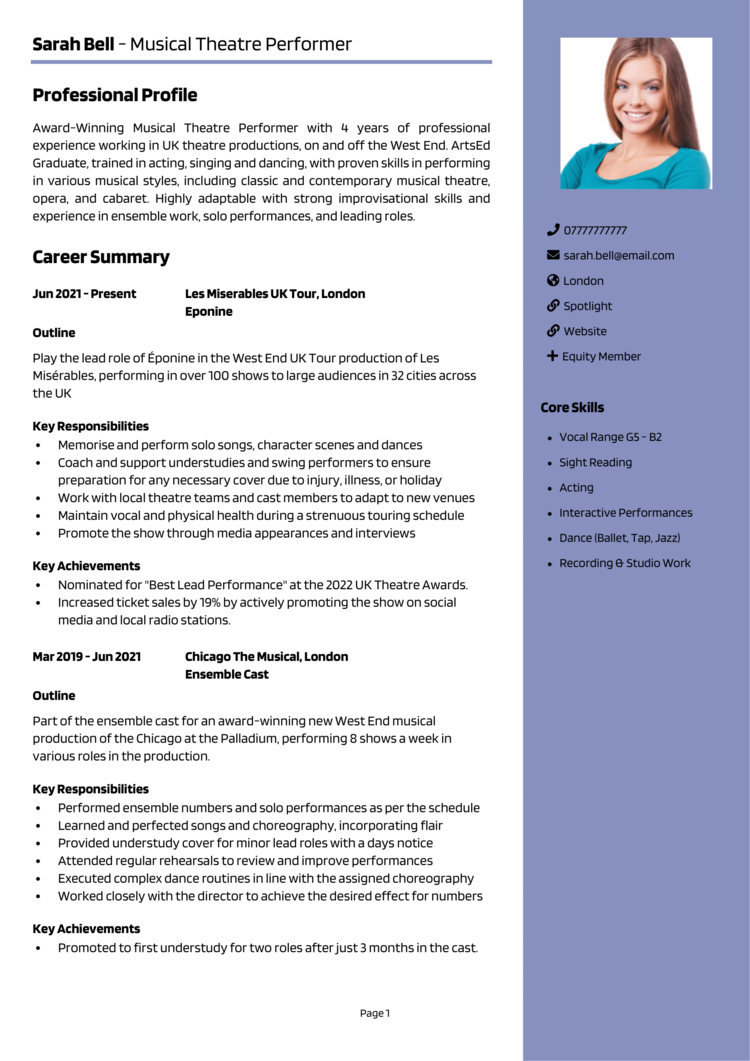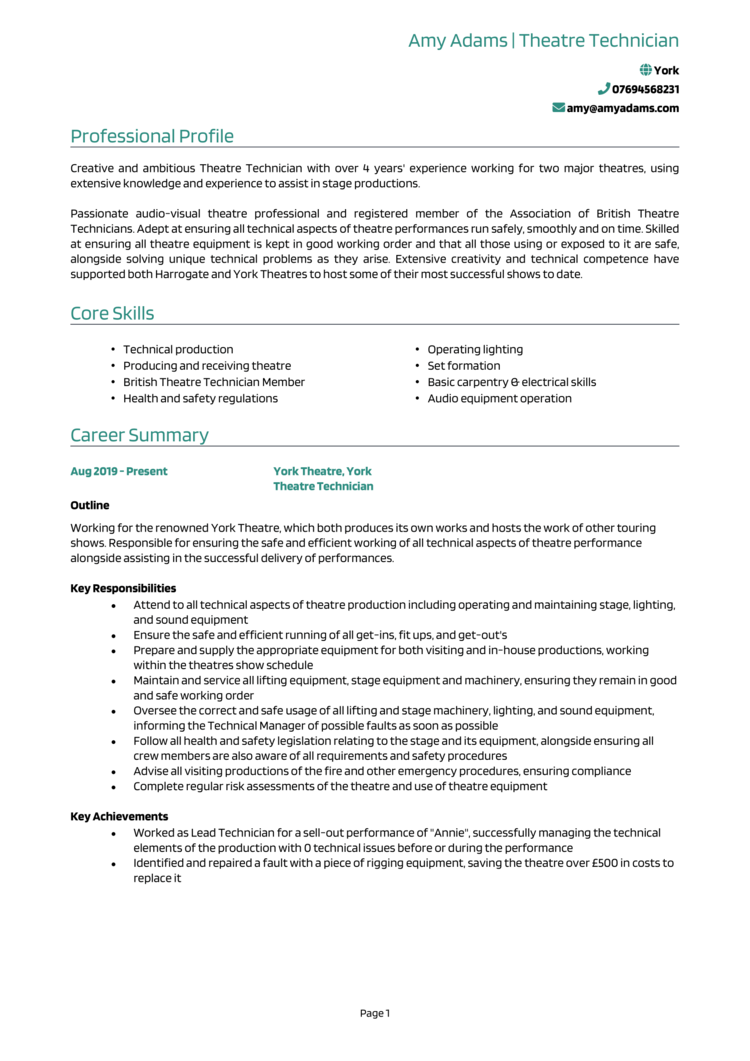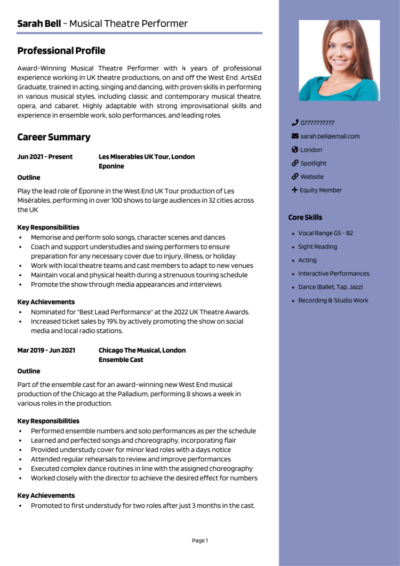Landing the lead certainly takes talent – but landing an audition? That takes a CV with star quality.
As a performer in musical theatre, your voice, dance skills, and stage presence are vital, but you first need a CV that clearly communicates your versatility and experience.
This guide, complete with Musical Theatre CV examples, will show you exactly how to create a CV that highlights your theatrical training and clearly convinces casting directors you belong in the spotlight.
Musical Theatre Performer CV

Musical Theatre Technician CV

Musical Theatre Director CV

How to write your Musical Theatre CV
Discover how to craft a winning Musical Theatre CV that lands interviews with this simple step-by-step guide.
Think of your CV as an opening number – it needs to capture attention instantly, clearly show your strengths, and leave casting teams eager for more. Directors and producers don’t have time to sift through vague information, so make your skills, experience, and training crystal-clear from the first glance.
Whether you’re writing a CV to audition for West End roles, regional productions, or touring companies, this guide ensures your CV gets a standing ovation by clearly highlighting your musical theatre credentials and compelling casting teams to see you perform.
What’s the right way to structure and format your Musical Theatre CV?


Put yourself in a recruiters’ shoes: you’ve got potentially hundreds of applicants, and not enough time to read through each thoroughly. Casting directors appreciate clarity as much as flawless choreography – so give them a CV that dances off the page. A tidy layout makes it easier for them to quickly spot your training, roles, and relevant skills, and leaves a strong first impression.
Here’s the structure to follow:
- Name and contact details – Contact details are clearly positioned at the top, making it easy for casting directors to contact you; a photo is highly recommended here.
- Profile – Open with a brief summary clearly highlighting your stage presence, vocal range, key skills, and any specialisms (dance styles or character types).
- Core skills – Showcase your specific talents, from vocal strengths and dance training to acting abilities and accents.
- Performance experience – Clearly detail roles you’ve performed, emphasising lead or supporting characters, production names, and venues.
- Education & training – Summarise relevant theatre training, workshops, degrees, and qualifications clearly and concisely.
- Additional info – Optionally include professional memberships, additional languages, hobbies, and industry awards.
Keep your format neat and concise, taking no more than two pages in length to cover everything. Clear headings and an equally clear font, along with bullet points to keep things skimmable will ensure your CV is as polished as your performances.
How to create a Musical Theatre CV profile


Your CV profile is where your audition really begins. You should clearly and briefly communicate your strengths, stage experience, and the unique qualities you bring to musical theatre roles, to assure any casting director that hiring you would be the right decision.
If you’re looking for your first breakout role, writing a personalised cover letter for each job is highly recommended. You should also write a more comprehensive personal statement instead of a profile, to allow more detail.
Musical Theatre CV profile examples
Profile 1
Versatile Musical Theatre Performer with four years of experience in stage productions, combining strong vocal ability, acting talent, and dance performance. Trained in classical and contemporary repertoire, with experience in touring productions and regional theatre. Adept at character development, script interpretation, and ensemble work. Passionate about storytelling through performance.
Profile 2
Dynamic Musical Theatre Actor with three years of experience in lead and supporting roles across musicals, cabaret, and immersive theatre. Skilled in jazz, tap, and ballet, with strong vocal training in both soprano and mezzo-soprano ranges. Comfortable with fast-paced rehearsals, live audiences, and adapting to diverse performance settings.
Profile 3
Experienced Musical Theatre Artist with six years of professional experience in large-scale theatre productions, cruise entertainment, and live corporate events. Strong background in stagecraft, vocal performance, and choreography. Proficient in working under direction, maintaining character integrity, and supporting cohesive ensemble performance.
Details to put in your Musical Theatre CV profile
Keep in mind these tips on what to include:
- Performance experience – Highlight notable productions or venues you’ve performed at.
- Vocal abilities – Clearly state your voice type and range (soprano, tenor, belter, etc.).
- Dance expertise – Mention specific dance styles you excel in (jazz, ballet, contemporary, tap).
- Acting strengths – Showcase your versatility or specialisations, such as comedic timing, dramatic roles, or character acting.
- Career goals – Briefly indicate the types of roles or productions you’re aiming for next.
Presenting your core skills


Casting directors prioritise clear, relevant CV skills that match the production they’re casting. Clearly list key musical theatre skills such as vocal range, dance abilities, accents, or unique talents like acrobatics or musical instruments.
Tailor this list according to the roles or productions you’re targeting – highlight specific skills that match the character types or styles you’re aiming to portray.
Essential skills that recruiters look for in a Musical Theatre CV
- Acting and Character Development – Portraying diverse roles through expressive performance and in-depth character study.
- Vocal Performance – Singing in various styles with control, projection, and emotional expression suitable for stage performance.
- Dance and Choreography – Performing complex routines across styles such as jazz, tap, and ballet as part of musical productions.
- Script and Score Interpretation – Reading and understanding scripts and musical scores to bring scenes and songs to life.
- Stage Presence and Movement – Commanding attention on stage through confident movement and strong non-verbal communication.
- Ensemble and Solo Work – Performing effectively both in group numbers and as a featured soloist within a production.
- Improvisation and Creativity – Adapting quickly to changes during live performances and contributing original ideas to scenes or choreography.
- Rehearsal and Performance Discipline – Following direction, maintaining stamina, and preparing consistently for shows and auditions.
- Costume and Prop Management – Handling quick changes and interacting with props and costumes to support storytelling.
- Collaboration and Teamwork – Working closely with directors, cast, and crew to deliver a cohesive and professional performance.
How to highlight work experience


Your performance history must clearly demonstrate your stage experience and versatility. Emphasise roles that reflect your strengths, clearly indicating lead, supporting, or ensemble roles alongside production names and directors.
Start with your most recent or most relevant theatre roles, clearly highlighting standout performances. If you’re newer to the stage, include relevant performances from training, showcases, or any work experience that demonstrate your skillset and potential.
How to make your past experience easy to read for employers

- Outline – Briefly describe each production, noting the venue, production company, and role type.
- Responsibilities – Highlight your specific contributions, such as leading roles, vocal solos, dance numbers, or special responsibilities, using action words like “performed,” “led,” or “interpreted.”
- Achievements – Showcase notable accomplishments, such as awards, critical recognition, or audience acclaim.
Example job entries for Musical Theatre
Lead Performer | The Marlowe Theatre Company
Outline
Performed lead roles in multiple musical theatre productions for a well-regarded regional theatre company, combining acting, singing, and dance in live stage performances.
Responsibilities
- Portrayed principal characters in productions such as Chicago, Rent, and Cabaret.
- Collaborated with directors, choreographers, and vocal coaches throughout rehearsals.
- Delivered emotionally engaging performances during nightly shows and matinees.
- Participated in promotional events and media appearances to support production outreach.
- Maintained vocal and physical fitness to ensure performance consistency across show runs.
Achievements
- Received critical acclaim for portrayal of Roxie Hart in Chicago, praised for stage presence and vocal performance.
- Completed over 100 performances with 100% attendance and consistent show quality.
- Contributed to a sell-out run and increased season ticket sales by 15 percent.
Ensemble Cast Member | Aurora Cruises
Outline
Performed in high-energy musical theatre revues and themed productions aboard a major international cruise line, entertaining global audiences.
Responsibilities
- Executed choreography and harmonies in professionally directed musical productions.
- Performed across multiple styles, including Broadway classics, pop tributes, and seasonal shows.
- Worked within a rotating cast schedule, covering multiple roles as needed.
- Participated in guest interaction events and workshops between performances.
- Assisted with costume changes, prop setup, and backstage coordination during live shows.
Achievements
- Maintained performance consistency across a seven-month contract with six shows per week.
- Received highest audience ratings in post-cruise feedback surveys for entertainment.
- Promoted to Dance Captain mid-contract, supporting rehearsal and cast cohesion.
Musical Theatre Teacher | StageBright Academy
Outline
Taught musical theatre to children and young adults at a local performing arts school, preparing students for productions and performance exams.
Responsibilities
- Led weekly classes in acting, singing, and musical theatre dance techniques.
- Prepared students for LAMDA and Trinity musical theatre exams.
- Directed and choreographed term-end showcases, involving solo and group numbers.
- Provided feedback and coaching to help students build stage confidence and vocal strength.
- Collaborated with fellow instructors to create integrated performing arts programs.
Achievements
- Helped 95 percent of students achieve distinction or merit in performance exams.
- Directed two student-led musicals, each with over 300 attendees.
- Recognised by parents and staff for fostering confidence and creativity in students.
Education and qualifications


Clearly listing your training and education reassures casting directors of your professionalism and technical skills.
Include degrees, conservatory training, workshops, masterclasses, or specialist vocal and dance tuition. Highlight notable theatre schools, institutions, or renowned teachers, clearly demonstrating the strength and credibility of your training.
With that in mind, an impressive portfolio tends to catch recruiters’ eyes more than formal qualifications: so keep this section nice and brief.
Qualifications recruiters look for in Musical Theatre
- BA (Hons) Musical Theatre – Demonstrates comprehensive theatre training in acting, singing, and dance.
- Diploma in Musical Theatre (Trinity or LAMDA) – Widely recognised qualifications showcasing your skills in musical theatre performance.
- Vocal Training Certification (e.g., ABRSM, Trinity Guildhall) – Clearly indicates high-level vocal training and technical proficiency.
- Dance Certifications (ISTD, RAD) – Highlights your expertise in specific dance techniques such as ballet, jazz, or tap.
- LAMDA Acting Grades (Level 6 or above) – Reinforces your acting credentials and professional capability on stage.





